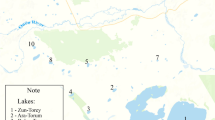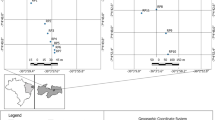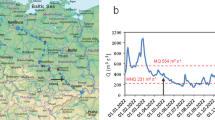Abstract
This paper reviews the results of experimental manipulations, carried out during the period 1977–1983, on the phytoplankton maintained in the limnetic enclosures at Blelham Tarn, English Lake District. Three categories of manipulations are considered.
The effects of variation in the scale and frequency of phosphorus loading (range: 0.3 to 2.5 g P m−2 a−1) upon the mean phytoplankton biomass, its seasonal distribution and specific dominance are shown to conform to well-established patterns and relationships observed in natural lakes. Much of the seasonal variability in species dominance occurred independently of nutrient ratios, though carbon availability has been critical at times. Attempts to manipulate the rates of removal of phytoplankton by grazing have confirmed that they act selectively against certain smaller species only, that they alter the rate of successional change, rather than its direction, and that they have little lasting influence upon the total phytoplankton standing crop. Attempts to manipulate rates of sinking loss through artificial enlargement of the epilimnetic circulation also regulated the light-conditions experienced by suspended phytoplankton.
Growth-rate relationships to an index of light exposure and to temperature fluctuation are also derived for several species and are related to morphological and physiological characters of the organisms concerned. These interpretations are briefly reviewed in relation to periodic cycles in natural lakes.
Similar content being viewed by others
References
Allen, T. F. H. & J. F. Koonce, 1973. Multivariate approaches to algal stratagems in systems analysis of phytoplankton. Ecology 54: 1234–1247.
Crumpton, W. G. & R. G. Wetzel, 1982. Effects of differential growth and mortality in the seasonal succession of phytoplankton populations in Lawrence Lake, Michigan. Ecology 63: 1729–1739.
Dillon, P. J. & F. H. Rigler, 1974. The phosphorus-chlorophyll relationship in lakes. Limnol. Oceanogr. 19: 767–773.
Ferguson, A. J. D., J. M. Thompson & C. S. Reynolds, 1982. Structure and dynamics of zooplankton communities maintained in closed systems, with special reference to the algal food supply. J. Plankton Res. 4: 523–543.
Gächter, R., 1979. MELIMEX, an experimental heavy metal pollution study: goals, experimental design and major findings. Schweiz. Z. Hydrol. 41: 169–176.
George, D. G., 1983. Interactions between zooplankton and phytoplankton distribution profiles in two large limnetic enclosures. J. Plankton Res. 5: 457–475.
Harris, G. P., 1978. Photosynthesis, productivity and growth: the physiological ecology of phytoplankton. Ergebn. Limnol. 10: 1–163.
Harris, G. P., 1980. Temporal and spatial scales in phytoplankton ecology. Mechanisms, methods, models and management. Can. J. Fish. aquat. Sci. 37: 877–900.
Harris, G. P., 1983. Mixed layer physics and phytoplankton populations: studies in equilibrium and non-equilibrium ecology. Prog. Phycol. Res. 2: 1–52.
Harris, G. P. & B. B. Piccinin, 1980. Physical variability and phytoplankton communites, 4. Temporal changes in the phytoplankton community of a physically variable lake. Arch. Hydrobiol. 89: 447–473.
Heaney, S. I., D. V. Chapman & H. R. Morison, 1983. The role of the cyst stage in the seasonal growth of the dinoflagellate Ceratium hirundinella within a small productive lake. Br. phycol. J. 18: 47–59.
Hutchinson, G. E., 1967. A treatise on limnology. Vol. 2. Introduction to lake biology and the limnoplankton. Wiley-Interscience, N.Y., 1115 pp.
Irish, A. E. & R. T. Clarke, 1984. Sampling designs for the estimation of phytoplankton abundance in limnetic environments. Br. phycol. J. 19: 57–66.
Jaworski, G. H. M., J. F. Talling & S. I. Heaney, 1981. The influence of carbon dioxide-depletion on growth and sinking rate of two planktonic diatoms in culture. Br. phycol. J. 16: 395–410.
Johnson, W. E. & J. R. Vallentyne, 1971. Rationale, background and development of experimental lake studies in northwestern Ontario. J. Fish. Res. Bd Can. 28: 123–128.
Jones, R. A. & G. F. Lee, 1982. Recent advances in assessing impact of phosphorus loads on eutrophication-related water quality. Wat. Res. 16: 503–515.
Kilham, P., 1971. A hypothesis concerning silica and the freshwater planktonic diatoms. Limnol. Oceanogr. 16: 10–18.
Knoechel, R. & J. Kalff, 1978. An in situ study of the productivity and population dynamics of five freshwater plankton diatom species. Limnol. Oceanogr. 23: 195–218.
Lack, T. J. & J. W. G. Lund, 1974. Observations and experiments on the phytoplankton of Blelham Tarn, English Lake District 1. The experimental tubes. Freshwat. Biol. 4: 399–415.
Lampert, W. & U. Schober, 1980. The importance of ‘threshold’ food concentrations. In W. C. Kerfoot (ed.), Evolution and ecology of zooplankton communities. University Press of New England, Hanover, New Hampshire: 264–267.
Lean, D. R. S., M. N. Charlton, B. K. Burnison, T. P. Murphy, S. E. Millards & K. R. Young, 1975. Phosphorus: changes in ecosystem metabolism from reduced loading. Verh. int. Ver. theor. angew. Limnol. 19: 249–257.
Lee, G. F., W. Rast & R. A. Jones, 1978. Eutrophication of water bodies: insights for an age-old problem. Envir. Sci. Technol. 12: 900–908.
Lehman, J. T., 1976. Ecological and nutritional studies on Dinobryon Ehrenb.: seasonal periodicity and the phosphate toxicity problem. Limnol. Oceanogr. 21: 646–658.
Lewis, W. M., 1978. Dynamics and succession of the phytoplankton in a tropical lake: Lake Lanao, Philippines. J. Ecol. 66: 849–880.
Lund, J. W. G., 1965. The ecology of the freshwater phytoplankton. Biol. Rev. 40: 231–293.
Lund, J. W. G., 1971. An artificial alteration of the seasonal cycle of the plankton diatom Melosira italica subsp. subarctica in an English lake. J. Ecol. 59: 521–533.
Lund, J. W. G., 1972. Preliminary observations on the use of large experimental tubes in lakes. Verh. int. Ver. theor. angew. Limnol. 18: 71–77.
Lund, J. W. G., 1975. The use of large experimental tubes in lakes. In R. E. Youngman (ed.), The effects of storage on water quality. Wat. Res. Cent., Medmemham, England: 291–312.
Lund, J. W. G., 1978. Changes in the phytoplankton of an English lake, 1945–1977. Hydrobiol. J. 14(1): 6–21.
Lund, J. W. G., 1981. Investigations on phytoplankton, with special reference to water usage. Occ. Publs Freshwat. Biol. Ass. 13: 64 pp.
Lund, J. W. G., G. H. M. Jaworski & C. Butterwick, 1975. Algal bioassay of water from Blelham Tarn, English Lake District, and the growth of planktonic diatoms. Arch. Hydrobiol., Suppl. 49: 49–69.
Lund, J. W. G. & C. S. Reynolds, 1982. The development and operation of large limnetic enclosures in Blelham Tarn, English Lake, District, and their contribution to phytoplankton ecology. Prog. phycol. Res. 1: 1–65.
Margalef, R., 1958. Temporal succession and spatial heterogeneity in phytoplankton. In A. A. Buzzati-Traverso (eds.), Perspectives in marine biology. University of California Press, Berkeley: 323–349.
Margalef, R., 1961. Communication of structure in planktonic populations. Limnol. Oceanogr. 6: 124–128.
Menzel, D. W. & J. Case, 1977. Controlled ecosystem pollution experiment: concept and design. Bull. mar. Sci. 27: 1–7.
Rast, W., A. Jones & G. F. Lee, 1983. Predictive capability of U.S. OECD phosphorus loading eutrophication response models. J. Wat. Pollut. Cont. Fed. 55: 990–1003.
Reynolds, C. S., 1971. Investigations on the phytoplankton of Crose Mere and other standing waters of the Shropshire-Cheshire Plain. PhD Thesis, Univ. Lond., 201 pp.
Reynolds, C. S., 1980a. Phytoplankton assemblages and their periodicity in stratifying lake systems. Holarc. Ecol. 3: 141–159.
Reynolds, C. S., 1980b. Processes controlling the quantities of biogenic materials in lakes and reservoirs subject to cultural eutrophication. Pollut. Rep. Dep. Envir. U.K. 8: 45–62.
Reynolds, C. S., 1982. Phytoplankton periodicity: its motivation, mechanisms and manipulation. Rep. Freshwat. biol. Ass. 50: 60–75.
Reynolds, C. S., 1983a. Growth-rate responses of Volvox aureus Ehrenb. (Chlorophyta, Volvocales) to variability in the physical environment. Br. phycol. J. 18: 433–442.
Reynolds, C. S., 1983b. A physiological interpretation of the dynamic responses of a planktonic diatom to physical variability of the environment. New Phytol. 95: 41–53.
Reynolds, C. S., 1984a. The ecology of freshwater phytoplankton. Cambridge University Press, Cambridge, England, 384 pp.
Reynolds, C. S., 1984b. Phytoplankton periodicity: the interactions of form, function and environmental variability. Freshwat. Biol. 14: 111–142.
Reynolds, C. S., 1984c. Artificial induction of surface blooms of Cyanobacteria. Verh. int. Ver. theor. angew. Limnol. 22: 638–643.
Reynolds, C. S. & C. Butterwick, 1979. Algal bioassay of unfertilized and artifically fertilized lake water maintained in Lund Tubes. Arch. Hydrobiol., Suppl. 56: 166–183.
Reynolds, C. S., J. M. Thompson, A. J. D. Ferguson & S. W. Wiseman, 1982. Loss processes in the population dynamics of phytoplankton maintained in closed systems. J. Plankton Res. 4: 561–600.
Reynolds, C. S. & A. E. Walsby, 1975. Water blooms. Biol. Rev. 50: 437–481.
Reynolds, C. S. & S. W. Wiseman, 1982. Sinking losses of phytoplankton maintained in closed limnetic systems. J. Plankton Res. 4, 489–522.
Reynolds, C. S., S. W. Wiseman & M. J. O. Clarke, 1984. Growth- and loss-rate responses of phytoplankton to intermittent artificial mixing and their potential application to the control of planktonic algal biomass. J. appl. Ecol. 21: 11–39.
Reynolds, C. S., S. W. Wiseman, B. M. Godfrey & C. Butterwick, 1983. Some effects of artificial mixing on the dynamics of phytoplankton in large limnetic enclosures. J. Plankton Res. 5: 203–234.
Rhee, G.-Y., 1978. Effects of N:P atomic ratios and nitrate limitation and algal growth, cell composition and nitrate uptake. Limnol. Oceanogr. 23: 10–25.
Rhee, G.-Y., 1982. Effect of environmental factors and their interactions on phytoplankton growth. In K. D. Marshall (ed.), Advances in microbial ecology, 6. Plenum Press, Lond.: 33–74.
Rhee, G.-Y. & I. J. Gotham, 1980. Optimum N:P ratios and coexistence of planktonic algae. J. Phycol. 16: 486–489.
Rhee, G.-Y. & I. J. Gotham, 1981. The effect of environmental factors on phytoplankton growth: temperature and the interactions of temperature with nutrient limitation. Limnol. Oceanogr. 26: 635–648.
Rodhe, W., 1948. Environmental requirements of freshwater plankton algae. Symb. bot. ups. 10: 5–149.
Round, F. E., 1971. The growth and succession of algal populations in freshwaters. Mitt. int. Ver. theor. angew. Limnol. 19: 70–99.
Sakamoto, M., 1966. Primary production by phytoplankton community in some Japanese lakes and its dependence on lake depth. Arch. Hydrobiol. 62: 1–28.
Smyly, W. J. P., 1976. Some effects of enclosure on the zooplankton in a small lake. Freshwat. Biol. 6: 241–251.
Sommer, U., 1981. The role of r- and K-selection in the succession of phytoplankton in Lake Constance. Acta oecol. 2: 327–342.
Sommer, U., 1984. The paradox of the plankton: fluctuations of phosphorus availability maintain diversity of phytoplankton in flow through cultures. Limnol. Oceanogr. 29: 633–636.
Sournia, A., 1982. Form and function in marine phytoplankton. Biol. Rev. 57: 347–394.
Stephenson, G. L., P. Hamilton, N. K. Kaushik, J. B. Robinson & K. R. Solomon, 1984. Spatial distribution of plankton in enclosures of three sizes. Can. J. Fish. aquat. Sci. 41: 1048–1054.
Talling, J. F., 1962. Freshwater algae. In R. A. Lewin (ed.), Physiology and biochemistry of algae. Academic Press, Lond.: 743–757.
Talling, J. F., 1976. The depletion of carbon dioxide from lake waters by phytoplankton. J. Ecol. 64: 79–121.
Thompson, J. M., A. J. D. Ferguson & C. S. Reynolds, 1982. Natural filtration rates of zooplankton in a closed system: the derivation of a community grazing index. J. Plankton Res. 4: 545–560.
Tilman, D., 1977. Resource competition between planktonic algae: an experimental and theoretical approach. Ecology 58: 338–348.
Tilman, D. & S. S. Kilman, 1976. Phosphate and silicate growth and uptake kinetics of the diatoms Asterionella formosa and Cyclotella meneghiniana in batch and semicontinuous culture. J. Phycol. 12: 375–383.
Tilman, D., S. S. Kilman & P. Kilham, 1982. Phytoplankton community ecology: the role of limiting nutrients. Ann. Rev. Ecol. Syst. 13: 349–372.
Trimbee, A. M. & G. P. Harris, 1984. Phytoplankton population dynamics of a small reservoir: effect of intermittent mixing on phytoplankton succession and the growth of blue-green algae. J. Plankton Res. 6: 699–713.
Vollenweider, R. A., 1976. Advances in defining critical loading levels for phosphorus in lake eutrophication. Mem. Ist. ital. Idrobiol. 33: 53–83.
Vollenweider, R. A. & J. Kerekes, 1980. The loading concept as basis for controlling eutrophication philosophy and preliminary results of the OECD programme on eutrophication. Prog. Wat. Technol. 12(2): 5–38.
Author information
Authors and Affiliations
Rights and permissions
About this article
Cite this article
Reynolds, C.S. Experimental manipulations of the phytoplankton periodicity in large limnetic enclosures in Blelham Tarn, English Lake District. Hydrobiologia 138, 43–64 (1986). https://doi.org/10.1007/BF00027231
Issue Date:
DOI: https://doi.org/10.1007/BF00027231




